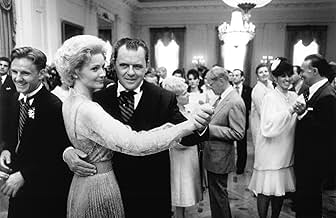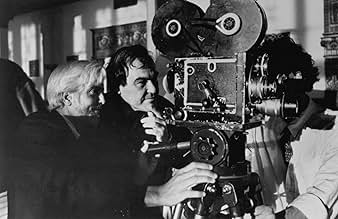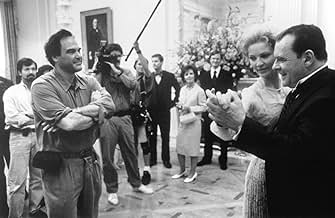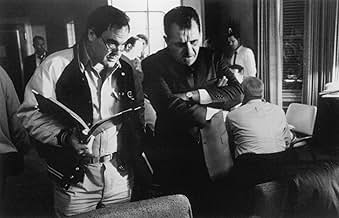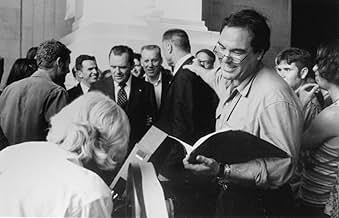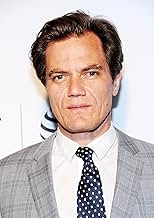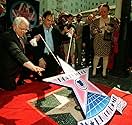A vida e trajectória política de Richard Nixon, desde a sua infância até à eleição para Presidente dos Estados Unidos da América, para dois mandatos e uma amarga queda em desgraça, após o es... Ler tudoA vida e trajectória política de Richard Nixon, desde a sua infância até à eleição para Presidente dos Estados Unidos da América, para dois mandatos e uma amarga queda em desgraça, após o escândalo Watergate e a sua renúncia ao cargo.A vida e trajectória política de Richard Nixon, desde a sua infância até à eleição para Presidente dos Estados Unidos da América, para dois mandatos e uma amarga queda em desgraça, após o escândalo Watergate e a sua renúncia ao cargo.
- Direção
- Roteiristas
- Artistas
- Indicado a 4 Oscars
- 11 vitórias e 18 indicações no total
- Direção
- Roteiristas
- Elenco e equipe completos
- Produção, bilheteria e muito mais no IMDbPro
Avaliações em destaque
Oliver Stone's direction is nothing short of a miracle. As in his 1991 masterpiece, JFK, he has a lot of different characters to bring to life on the screen. He helps his actors fashion their performances with miraculous accuracy. Paul Sorvino is dead-on as Henry Kissinger, as is Joan Allen as Pat Nixon, and Bob Hoskins as the mysterious, mean-spirited J. Edgar Hoover.
The writing is also represents a triumph. Stone and co. are able to synthesize entire pages of historical prose into digestible chunks of dialogue. Aspiring screenwriters should seriously take note.
Although 1995 also saw the likes of Casino, Seven, Heat, and The Usual Suspects, Nixon is the ultimate champion. History on screen has rarely been this exhilarating.
Great cast. Hopkins is a hard working star. What a shame he lost to the Hoffman aper Cage. And Nixon? What a loser. What a terrible insufferable tragic loser. It surely was a challenge to do this for Hopkins.
The biggest most significant detriment is of course one knows not where fact ends and fiction begins. Stone doesn't exactly have a reputation for avoiding hyperbole.
But taken as a personality portrait it's devastating. You might know your history but you've probably never imagined things were like this. You could have imagined them if you'd taken the time, but this movie brings you there.
It's just a tragic movie about an extraordinarily tragic figure. Stone brought you Salvador where he showed how well he knows the art of movie making; he brought you the screenplay for Scarface; and so forth. He can do it, whether or not he goes too far on some occasions. The movie production itself is very good.
And it's a long one. It's not a popcorn movie. It's extremely depressing and frightful. A look into one very weird pathology. But a 7 out of 10 is not out of order.
And in this, Oliver Stone is perfectly right. As it stands, the film is very long, and dense with detail. There is no room for the minutiae of the cover-up, which in any event would make for a confusing narrative. Stone's subject is Nixon the man, not the edifice that toppled around him.
And what a man. Richard Milhous Nixon is a truly fascinating personality - both statesman and charlatan: ruthless and vulnerable: unable to express his emotions, yet the most emotional of politicians: a man who spent his life in the law and in high office, but who never absorbed the legal and ethical mores of public life. Genius and crook, bold visionary and spiteful backstabber, Nixon will continue to spellbind biographers for decades to come.
"That's when it starts," says Stone's Nixon, "when you're a kid." The film takes us to Whittier, California in 1925 to see the unloved boy who struggled painfully to earn his parents' approval, without ever quite succeeding. As a teenager, he levered his way into the school football squad by sheer willpower. Lacking talent, he doggedly subjected himself to repeated physical battering in the scrimmages, "a tackle dummy with guts". This syndrome recurs throughout his career. Always susceptible to scathing criticism, never quite commanding respect, Nixon never the less kept ploughing back into the melee when wiser, lesser men would have quit. It is hardly surprising that the years of punishment should have left psychological scars.
Nixon's hatred of John Kennedy had more than one source. He was devastated by the defeat in the 1960 presidential election, but not simply because of disappointment at losing, or even because the Kennedy victory carried the odour of fraud: bitterest of all for Nixon was the realisation that the Kennedy people had played hardball more effectively than the Republicans. Nixon had been out-sharked, and it hurt. On a more profound level still, John Kennedy was everything that Nixon could never be. He was a smooth, handsome prince among men, exuding poise and confidence, a patrician imbued with the habit of authority. To Nixon, the perpetual outsider, the quaker geek who looked shoddy and disreputable, Kennedy seemed to have the dice unfairly loaded in his favour. JFK was an East Coast bright boy and war hero, fabulously wealthy and impeccably well-connected. Nixon owned nothing and knew nobody, and was all too obviously 'on the make'. The great witch-hunts, of Hiss in the 1940's and Ellsberg in the 1970's, are manifestations of the chip on Nixon's shoulder, the fathomless bile that he directed at East Coast college boys.
Nixon always imagined that he was hiding his pain from the world, whereas in fact it was on global display. His nervous little laugh at moments of emotional crisis was so false, so gut-wrenchingly inappropriate, that the onlooker could catch a glimpse of the man's tortured soul. Hopkins captures the wretched laugh with devastating effectiveness, both in the scene where Nixon is confronted by a hostile man in the TV studio audience, and when he solemnly promises that none of the president's men will go to jail. In the "Checkers" broadcast and the presidential TV address on Watergate, Nixon tries to assure the camera that he is not a crook, and on both occasions he has the exact opposite effect, confirming to the viewer that that is precisely what he is. Nixon seems incapable of examining his own conscience: there is a hard core which his rational mind cannot penetrate. Maybe that is why Stone has him referring to himself in the third person throughout the film.
'They' were always out to get Nixon, without it ever being made clear just exactly who 'they' might be. The imperative for this deeply paranoid man was always to be braced, ready for the coming tackle, or to organise pre-emptive strikes against 'them'. Obstructing justice and tampering with evidence were, to Nixon, self-defensive steps that did not need to be justified. It was obvious that such things had to be done. The mystery at the heart of Watergate - why a president so steeped in criminal conspiracy should tape-record his own intimate conversations - makes sense when viewed from Nixon's end of the telescope. He had to have the goods on his own men, ready for the day when they turned on him. It goes even further. This emotional cripple could not bare his bleeding soul to anyone, so his tapes became his confessional and his confidante. Stone's film repeatedly shows Nixon in his awkward arms-extended, double V-sign pose. It is not by chance that it looks like a crucifixion.
Directed by Oliver Stone, it's not appropriate for people who don't know anything about Nixon, or Watergate, or this period of American history, since the film wasn't wasting time explaining anything. So if you didn't understand why Nixon opened the US to China or what was the Watergate or the Bay of Pigs, I suggest you ignore the movie for now and first go read some books or see some documentaries about it. Another problem I want to highlight is the huge web of conspiracies and obscure theories that the film weaves around the president. It never lets us understand what "crimes of responsibility" Nixon has committed. The film also suggests, without subtleties, that Nixon was a simple man who rose in life but wasn't accepted by the "American aristocracy" because of this humble origin, which left him deeply hurt. I don't know if it's true, but the film indicates that as origin of President's lack of scruples.
Anthony Hopkins assures the main role in an interesting performance, but that's far from being his best. He made a good preparation and tried his best to be Nixon, but has few physical similarities with him, not to mention his extreme difficulty in imitating president's characteristic voice. Anyway, Hopkins was brilliant at his character's psychological work, with most dramatic scenes going on as he, semi-drunk, reviews his decisions while listening to his famous audio tapes. The remaining cast does a reasonable supporting work. I will not close my review without left a word of appreciation to the sets and costumes, which rebuilt the atmosphere and culture of the Seventies quite well, much like the rooms and offices within White House. Not being exceptional, it's an elegant, quality film, that helps us think about an important period in American history.
Another reason to see this film is the brilliant, absolutely overwhelming lead performance by Anthony Hopkins; his Nixon may not look or sound exactly like the 37th president (but come on, except maybe for Ed Sullivan, who does?) but he embodies his qualities - strengths as well as weaknesses - to such an enormous degree that he simply BECOMES Nixon, at least for the three hours the movie is on screen.
I have to say, though, I was not nearly as impressed as every one else (critics and general audiences alike) seems to be about Joan Allen as Pat Nixon. It's nothing against her performance, she did fine, it's just that as written, the part is rather weak. In fact, I was much more bothered about the liberties the filmmakers took in fleshing out her character than in all the political events; it's like, whenever they wanted to have someone blast Nixon or act as his conscience, they'd trot out Ol' Pat, giving her some of the most embarrasingly "speechified" moments in all of the movies - almost none of their scenes together ringed true as husband as wife; it was more like Nixon sitting across from the Filmmakers' Conscience. In fact, she's angry at him so often in the film you have to wonder, what exactly does she love about the man? The film never answers (or attempts to answer) this question.
But this one minor quibble is not enough to make me downgrade this film. It is an absolutely stunning achievement by any stretch of the imagination, and it contains some interesting thematic and technical echoes of both Citizen Kane (cavernous high ceiling scenes, a "March of Time"-type newsreel on Nixon, a dinner scene between Dick and Pat at a long, impersonal table) as well as The Godfather (the burnished, half-dark half-light cinematography, several "chamber of power" scenes in tight, dark and claustrophobic rooms)that I found, in context, to be totally appropriate. It paints both Nixon and the times he (and the country) lived through on a grand and mythic scale that was truly awesome and, once again, entirely appropriate. Yes, it's a film that is at times big, loud and bombastic (because so, after all, was Nixon himself) but, just as often quiet, contemplative and told at an achingly *human* level. The contrast between these two states is what gives the film a good deal of its overall power and, as I've said, I never would have believed that Stone would have been capable of doing the smaller, quieter scenes so well.
This is a good film to have on tape or DVD, for two reasons. It's so long, and so dense with facts, characters and events, that you're not likely to want to watch it all the way straight through (the first time I saw it was in the theater and though I was held spellbound, I began wishing for an intermission at about the two-hour mark, not so much to stretch my legs but to give my brain a chance to process all I'd seen and heard so far). Also, and more importantly, the videotape includes after the credits two scenes cut out of the final film for time purposes. In both cases, I believe, a severe mistake was made - these are both, I believe, ESSENTIAL sequences; not just nice to have as an additional bargain, but scenes which Stone should have fought tooth and nail to keep in (even cutting out some others if he had to - my vote would have been to excise a few of those Pat Nixon scenes instead). Once scene involves Nixon's visit to the CIA and another a discussion between Nixon and J. Edgar Hoover in the Oval Office. The first scene is a masterpiece of writing and acting (with Sam Waterston as CIA Director Richard Helms, otherwise in no other scene of the movie) and the other is, I think, key in understanding Nixon's motivation to begin taping his White House conversations in the first place (also - an issue which is touched on no other place in the movie). I feel that these two scenes should be edited back into their appropriate places in the movie; seeing them separated from the rest of the film is better than not seeing them at all, but they really belong as part of the entire story.
Você sabia?
- CuriosidadesTo gain the feel of Richard Nixon, Anthony Hopkins watched on tape almost every speech Nixon ever made several times. He also met some people who knew Nixon and could lend Hopkins some insight on him.
- Erros de gravaçãoThe film shows Nixon signing his resignation letter the day before he leaves office and prior to it being publicly announced. Historically, Nixon informed the nation in an address the night before leaving office, and then signed the letter the next day, which was his last morning in the White House.
- Citações
Richard M. Nixon: [to a portrait of Kennedy] When they look at you, they see what they want to be. When they look at me, they see what they are.
- Cenas durante ou pós-créditosSecond opening credits: "For what is a man profited, if he shall gain the whole world, and lose his own soul?" Matthew 16:26.
- Versões alternativasLetterbox video version features additional outtake footage, including a scene starring Sam Waterston as CIA director Richard Helms.
- Trilhas sonorasMenuetto
from Schubert's "Symphony No. 2 in B Flat Major, D 125"
Written by Franz Schubert
Performed by Koninklijk Concertgebouworkest (as Royal Concertgebouw Orchestra)
Nikolaus Harnoncourt, Conductor
Courtesy of Teldec Classics International GmbH
By arrangement with Warner Special Products
Principais escolhas
- How long is Nixon?Fornecido pela Alexa
Detalhes
- Data de lançamento
- País de origem
- Idiomas
- Também conhecido como
- Ніксон
- Locações de filme
- Mission Inn - 3649 Mission Inn Avenue, Riverside, Califórnia, EUA(Press Enterprise newspaper, Sunday, Nov. 23, 2003)
- Empresas de produção
- Consulte mais créditos da empresa na IMDbPro
Bilheteria
- Orçamento
- US$ 44.000.000 (estimativa)
- Faturamento bruto nos EUA e Canadá
- US$ 13.681.765
- Fim de semana de estreia nos EUA e Canadá
- US$ 2.206.506
- 25 de dez. de 1995
- Faturamento bruto mundial
- US$ 13.681.765
- Tempo de duração
- 3 h 12 min(192 min)
- Cor
- Mixagem de som
- Proporção
- 2.39 : 1


